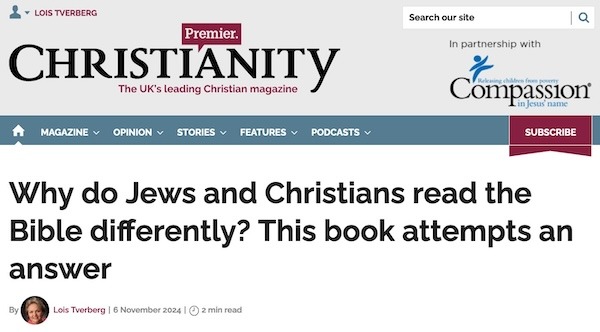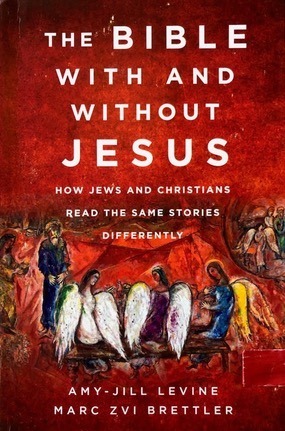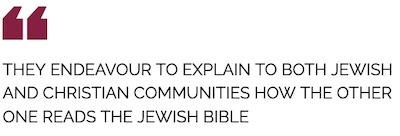
Premier Christianity, the UK Christian magazine, asked me to write a review The Bible With and Without Jesus by Amy-Jill Levine and Marc Zvi Brettler. You can read it on their website at this at this link.
I’ve posted a longer version below where I’ve bolded points that I wanted readers not to miss, and then at the end, shared some reflections about AJ Levine and the book for my own readers.
(This first blurb in bold & italics was not my words but added by the magazine.)
~~~~~
If you want to understand why Jews read the Bible in the way they do, then The Bible With and Without Jesus may be worth a read, says Lois Tverberg

We live in a rare time of openness, when Jewish scholars feel welcome to write about the Bible for an audience of both Jews and Christians. Both communities wonder how the common scriptures that we share can be read so differently by the other. In The Bible With and Without Jesus, two Jewish scholars attempt to answer that question.
Amy-Jill Levine is a Jewish New Testament scholar and Mark Brettler is a highly-respected Jewish scholar on the Tanakh, which is what Jews call the Bible and Christians call the Old Testament.
Together they endeavor to explain to both Jewish and Christian communities how the other one reads the Jewish Bible, showing multiple ways that texts can be read. The point of the book is to present both sides and not to promote one interpretation as the right one.
The usual pattern of each chapter is to open up a passage, point out where Christians find their ideas, and then explain why Jews don’t read the text this way. Then the authors explore a wide variety of Jewish viewpoints and include some imaginative, midrashic sermons too. In that light, the Christian reading of the text seems to fit in as another interesting ‘spin’. This approach won’t feel very affirming to traditional Christians but will likely satisfy Jewish readers.
Strengths and weaknesses
One strength of this book is the even-handed way that Levine and Brettler present the conflicts that have gone on between Christian and Jewish communities. Both groups have used proof-texts to produce angry polemics against the other, and both have woven arguments into sermons and commentaries.

The authors note many Jewish teachings that include jabs against Christian ideas. But then they follow by noting where seemingly Christian ideas surface in Jewish texts down through the ages, either from the influence of Christianity, or from traditions that lingered through centuries from when some early Jews believed in Jesus.
It’s surprising that the authors don’t support the usual Jewish response to Christian missionaries who bring up Isaiah 53– that the Suffering Servant of Isaiah 53 is the nation of Israel, not a single individual. Levine and Brettler point out that in the earliest centuries, almost all Jewish interpreters read Isaiah 53 as about an individual, who may or may not have been believed to be the Messiah. Only after the Crusades (1096-1291), which greatly embittered Jews against Christians, did the standard interpretation of Isaiah 53 focus on the nation of Israel suffering for the sins of the world.
The book often presents flimsy explanations of Christian ideas, as if they arose from the speculative reading of a verse or two. Two lines in Genesis 1 are used to represent the Christian belief in the Holy Spirit and Trinity: “the Spirit of God was hovering over the waters,” (Genesis 1:2) and “Let us make mankind in our image.” (Genesis 1:26) While these verses are subject to multiple interpretations, a much wider network of Scripture in fact underlies Christian theology about the Spirit (including many passages in Isaiah, Ezekiel, Joel, the Psalms, etc), as well as the early Church’s experience of the miraculous outpouring of the Holy Spirit at Pentecost. Deconstructed Bible verses never do justice to complex theologies, either Christian or Jewish.
Another issue I have is that the authors sometimes hide Jewish viewpoints that don’t fit their conclusions. On page 145 they stridently assert that “not a single text in the huge corpus of rabbinic Judaism suggests that after the Temple was destroyed, blood is essential to atonement.”
 What they aren’t mentioning is that since before 700CE, a good fraction of observant Jews has practiced kapparot on the eve of Yom Kippur, a ceremony where a person waves a chicken over his head and places his sins upon it. The chicken is then killed and the meat given to the poor. This is clearly an atonement sacrifice – kapparot means ‘atonements’ – but rabbinic scholars scorned the practice and didn’t write about it.
What they aren’t mentioning is that since before 700CE, a good fraction of observant Jews has practiced kapparot on the eve of Yom Kippur, a ceremony where a person waves a chicken over his head and places his sins upon it. The chicken is then killed and the meat given to the poor. This is clearly an atonement sacrifice – kapparot means ‘atonements’ – but rabbinic scholars scorned the practice and didn’t write about it.
The fact that the ceremony exists until this day reveals that sacrifice is seen as necessary for atonement by many Jews. Given the diversity of Jewish thought in The Bible With and Without Jesus, I was surprised that the authors couldn’t admit that this viewpoint does indeed exist.
Opening the lines of communication
Despite some weaknesses, The Bible With and Without Jesus includes a remarkable amount of interesting material about the ways Christians and Jews have interpreted the biblical texts, and the authors walk a difficult rope to find conclusions that will please both communities.
Christians should understand that the voices here are from secular academics who assume that the biblical text is an edited product of human understanding. But I applaud the authors’ desire to open the lines of communication between Christians and Jews.
![]()
(3 out of 5 stars)
~~~~~~~~~~~~~~
So there’s my official review for Premier Christianity. Honestly, I was holding back somewhat on my frustration, since I don’t really want to disparage the work of others if I can avoid it, and the book really had an admirable goal of bridging the divide between Jews and Christians.
But I feel like I should be more transparent with readers who know me better. Here are a few more thoughts.
A lot of people assume that I’m a fan of Amy-Jill Levine because she writes books on Jesus in his Jewish context like The Misunderstood Jew, Short Stories by Jesus, etc. Her specialty seems really to be Jewish-Christian relations rather than Jesus’ historical context. Her writing often seems remarkably unaware of the breadth of Jewish and Christian scholarship on Jesus in his setting within the Second Temple Period and early rabbinic Judaism.1
I do respect the Jewish need to combat the enormous amount of Christian antisemitism down through the centuries, especially since October 7th. Jews have very good reason to defend themselves from Christian accusations. And Christians are woefully ignorant of the wider context of Jesus, which Judaism often preserves very well. I really admire Levine and Brettler’s effort to bridge this painful divide.
But I found many things about the book that were dissatisfying. The book advances many speculative theories uncritically, like the idea that perhaps at one time the Israelites believed that God demanded human sacrifice, or that Hokmah (Wisdom) was a goddess that Israel once worshiped. These are shared as possible ways to read the biblical text, while ignoring passages that undermine or refute them.
The book also omits the fact that many early rabbinic discussions occurred about two “Powers” in heaven, which were based on the fact that in both Daniel 7 and Psalm 110, a human being is seated at the right hand of God to rule over the world.2 This is obviously where Christians get their ideas about Jesus as the divine Son of God who reigns over the world, and it is found in Jewish literature! This is widely known, so much that the oversight felt dishonest, like not mentioning that Hasidic Jews perform kapparot before Yom Kippur. (Check out this video for more.)
The Bible With and Without Jesus is really written for a Jewish and secular audience who will like the fact that it under-represents reasons for Christian faith and generally puts Christianity into the category of speculative midrash that can be ignored.
Scholarly Deconstructionism
Those of you who are used to the academic study of religion will recognize this book’s style, where the final opinion that embraced isn’t actually either that of the traditional Jew or Christian. It’s actually that of the scholarly deconstructionist who assumes that the biblical text is mostly ahistorical and open to one’s interpretive fancy.
There are many other very fine Jewish scholars that I would recommend reading instead. Here are just a few: Abraham Heschel, Moshe Weinfeld, Nahum Sarna, Jacob Milgrom, Joshua Berman and Joseph Telushkin.
I’ve also written lists of first books I’d read on the Jewishness of Jesus, as well as Jewish Bible commentaries I highly recommend.
~~~~~

1Like for instance, Shmuel Safrai, David Flusser, Brad Young, Steve Notley, David Bivin and other Jews and Christians who have studied the New Testament within Second Temple Period and early rabbinic Judaism.
Their work is published in many books as well as in the journal Jerusalem Perspective, which I especially highly recommend.
2See Alan Segal’s Two Powers in Heaven: Early Rabbinic Reports about Christianity and Gnosticism (Baylor, 2012)
Jerrold & Joanne Asal says
Shalom, Lois, we enjoy your writings. As you know, there are many names that could be added to your list above and I have decided to provide some of them. We have studies from all of them and we know most of them and are good friends with some of them. Here are some of the names that come to mind. Roy Blizzard, Ron Moseley, John Garr, Ken Hanson, Marvin Wilson, Bill Bean, Jonnie Bradford, Robert Lindsey and his daughter, etc. We are glad to see you continuing the work started by some of these men and women of G-D. Shalom for now, Jerry & Joanne Asal
Lois Tverberg says
Jerry & Joanne, thanks for including these other good sources for information, who are Christian authors who have written about the Jewish context of Jesus, rather than Jewish authors. I agree they have shared much good material too.
Doug Ward says
Thanks for your review! I own this book and have read 1/3 of it so far. My impressions match up well with yours.
Lois Tverberg says
Doug, I’m glad you and I are reading the same way. I enjoy your writing for the Center for Judaic-Christian Studies a lot. JCStudies.com is one of my favorite sources of information.